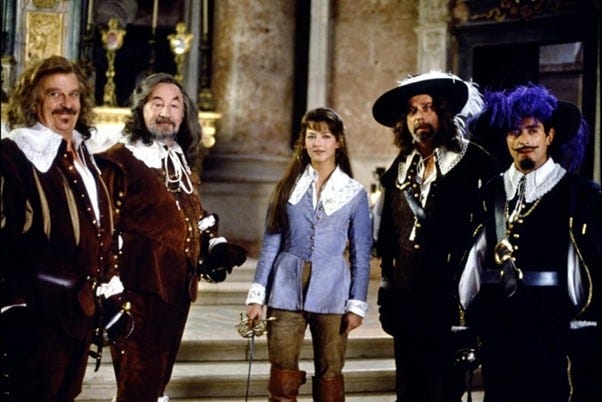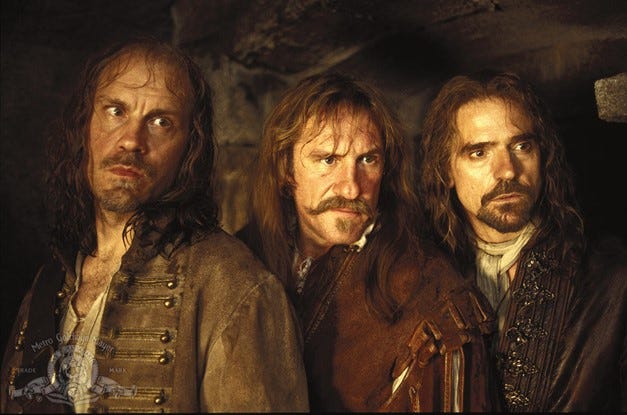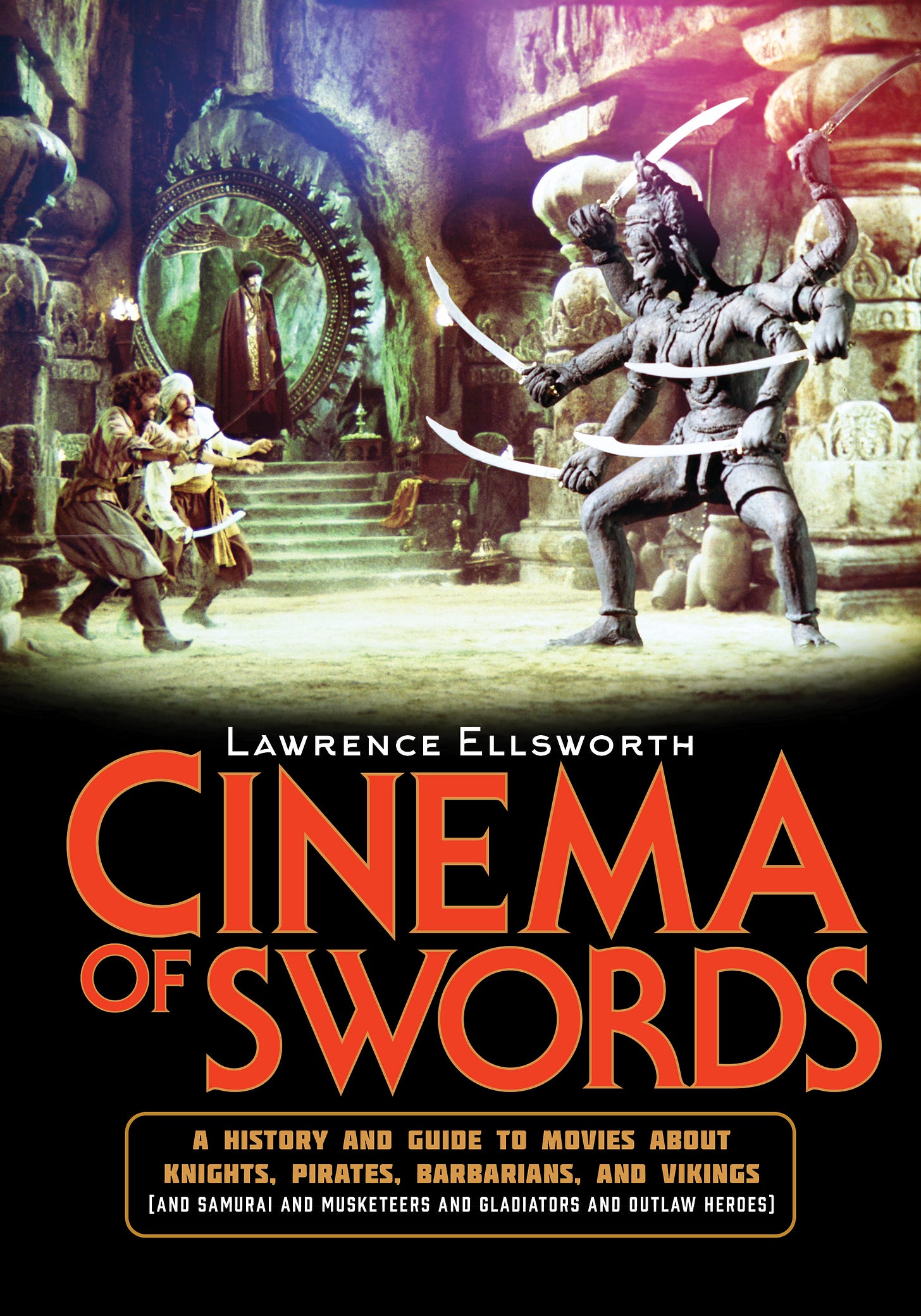Cinema of Swords
A Popular Guide to Movies about Knights, Pirates, Samurai, and Vikings (And Barbarians, Musketeers, Gladiators, and Outlaw Heroes)
By Lawrence Ellsworth
Welcome to the Cinema of Swords Substack! This series is a companion and expansion to my Cinema of Swords hardcover (Applause Books, 2023), which collects over 400 tasty mini-reviews of screen swashbucklers from the Silent Era through The Princess Bride.
This Substack builds on that foundation, continuing forward with reviews of swordplay movies and TV shows from the ‘90s to the present. Every week I’ll present two to four illustrated reviews on a common theme written both to inform and to entertain.
If you enjoyed the contents of the book, this weekly series will give you plenty more of the same. (And if you haven’t seen the book, look for it wherever you do your book shopping!)
Dumas Redux
In France, where Alexandre Dumas is still beloved, there are always one or two film adaptations of his novels bubbling away in pre-production, and occasionally one of them gets completed and makes it to the world’s theaters. There were several French Dumas adaptations in the ‘90s, and one of them, Queen Margot, is particularly worth your time and attention. Hollywood, alas, was less enthusiastic about Dumas during the ‘90s than the French, at least until Randall Wallace decided to follow Braveheart with a big-budget production of The Man in the Iron Mask. It was a nice try, and a global success thanks to the post-Titanic popularity of its star, Leonard DiCaprio, but in retrospect it doesn’t hold up as well as this week’s pair of French features.
Revenge of the Musketeers
Rating: ****
Origin: France, 1994
Director: Bertrand Tavernier
Source: Miramax DVD
This is a genial French musketeers farce, played for laughs but remarkably faithful to the source material. The story is a sequel to The Three Musketeers, a sort of alternative to Dumas’ Twenty Years After, telling not of the son of Milady, but instead of two daughters, one of the hero d’Artagnan and the other of the villain Rochefort.
Since the deaths of Louis XIII and Cardinal Richelieu, France has been ruled by Richelieu’s Italian protégé, Cardinal Mazarin (Gigi Proietti), but young Louis XIV (Stéphane Legros) is coming of age and conspiracies threaten the realm. Far from Paris, deep in the Périgord, Eloise d’Artagnan (Sophie Marceau) has grown to adulthood in a convent, where one of these conspiracies rudely intrudes, resulting in the death of the mother superior. Eloise vows revenge and sets out for the capital to find her father d’Artagnan (Philippe Noiret), whom she assumes is still Captain of the King’s Musketeers. But d’Artagnan, forcibly retired, is now an aging cavalier eking out a living as a fencing instructor, and in no mood to hear about imaginary conspiracies from his bumptious young daughter.
But the conspiracy is real, led by the ambitious Duc de Crassac (Claude Rich) and his wicked enforcer, Eglantine de Rochefort (Charlotte Kady), who dresses all in red and is a crack shot with a brace of pistols. Cardinal Mazarin refuses to listen to Eloise’s warning, so to foil the conspiracy she enlists her father to find and recruit his old friends Aramis (Sami Frey), Porthos (Raoul Billerey), and Athos (Jean-Luc Bideau) to save France from Crassac and his cadre of disloyal nobles.
This is a French farce, so everyone, hero or villain, is a buffoon of one flavor or another, but that’s fine, the jokes have to come from somewhere. Everybody bumbles around following false clues, but eventually it becomes clear that serious villainy is at work. The four musketeers are well drawn, each distinctive in his way, and quite charming as aging duffers who don’t quite have what they used to. Marceau is perky and lovable and determined to prove herself, and though her Eloise has an inborn talent for fencing she’s a dangerous wild card with a blade until she gets some lessons from her incredible father. It’s just as well, because as the story progresses, she’s going to need those fencing skills.
The best scene in the film, however, occurs sans Eloise, as the four musketeers ride to save the nuns from her convent from being carried off aboard the villain’s slave ship. The slavers see the heroes coming, so they raise their gangplank and begin to push off from the wharf, but d’Artagnan, Porthos, and Athos attack at the gallop, leaping their horses from the dock onto the deck of the ship. “Heroic,” says Aramis, “but absurd,” as he cuts the rope that drops the gangplank and walks aboard the ship like the civilized bishop he has become. The rough melee that follows shows that the musketeers, though slower, are more cunning than their thuggish opponents, and they slyly defeat four times their number while barely working up a sweat.
Revenge of the Musketeers is longer and slower than it ought to be, but you’ll find yourself smiling more than you expected, and the fine climactic duel, on the roof of a cathedral at dawn, might make you forget the slow parts. Dumas would have liked it.
Queen Margot (or La Reine Margot)
Rating: *****
Origin: France/Italy/Germany, 1994
Director: Patrice Chéreau
Source: Pathé Blu-ray
All those Monte Cristos notwithstanding, this is the finest non-Musketeers film adaptation of a novel by Alexandre Dumas, co-written and directed by the estimable Patrice Chéreau. It’s a tragedy and nothing but, as you’d expect from a story whose centerpiece is the 1572 St. Bartholomew’s Day Massacre—but more of that anon.
Margot is set mainly in Paris during the Reformation, at the peak of France’s long and bloody Wars of Religion. On the Catholic side are Queen Mother Catherine de Médicis (Virna Lisi), King Charles IX (Jean-Hugues Anglade), his ambitious younger brothers the dukes of Anjou (Pascal Greggory) and Alençon (Julien Rassam), their sister Margot (Isabelle Adjani) and her sometime lover the Duc de Guise (Miguel Bosé). The heads of the Huguenot (Protestant) faction are Admiral Coligny (Jean-Claude Brialy) and most importantly Henri, King of Navarre (Daniel Auteuil), who has been engaged by the queen mother to Margot in a bid to bring the two sides together and end the fighting—one way or another.
Paris is jammed with guests for the wedding, mainly Huguenots from the provinces, so much so that a Protestant gentleman soldier, La Môle (Vincent Perez), is forced to share a room with Coconnas (Claudio Amendola), a Catholic swordsman. They are rivals from their first meeting, but minor squabbles must give way in the shadow of the magnificent wedding of Margot and Henri. However, all sorts of conflicts raise their heads during the debauched reception that follows, and it becomes clear that the marriage between Catholic and Protestant has settled nothing. Margot and her brothers despise Henri for a weakling, and she will have nothing to do with him—in fact, she’s already had a hot masked back-alley assignation with La Môle earlier. But Henri makes an impassioned plea that they are in danger and should be political allies, even if they never live as husband and wife.
Henri is right: dark plots are bubbling to the surface. King Charles has become attached to the Protestant leader Coligny, alienating him from his family; Queen Mother Catherine can’t abide this, and orders Coligny’s assassination. But the assassination is bungled, Coligny survives, the Huguenots are up in arms, and Catherine decides the moment is at hand to crush the Protestants once and for all. And thus, the massacre of St. Bartholomew’s Day begins, thousands of Huguenots cut down in the streets and the Louvre as the bells toll on and on. The depiction of this mass murder is harrowing and unforgettable, shot like a Rembrandt painting with piles of contorted, half-naked bodies by Goya.
And yet, the film isn’t even half over: there’s more murder ahead, as well as political intrigue, pathos, redemption, and romance, as the main characters work out their complex love—well, it’s not a triangle, more like a pentagon. There’s a magnificent royal boar hunt in the Bois de Rambouillet, a plot involving the best poisoned book in all literature, solemn vows to preserve lovers’ severed heads beyond the grave, and the queen’s alchemist reading her family’s grim future in the contours of a murdered man’s brain.
The casting here is virtually flawless, nearly everyone giving superb performances, particularly Virna Lisi as the haunted Queen Catherine, and Daniel Auteuil as Henri, who is bold, determined, and never less than terrified, his eyes continually flickering back and forth to detect the next threat. The visuals vary from lush to austere at need, and the direction never once puts its foot wrong. This is a long movie, but be sure to look for the 2014 Blu-ray version that restores the film to its full 162-minute running time. Not a minute is wasted, and you’ll want all of them.
The Man in the Iron Mask (1998)
Rating: ***
Origin: United States, 1998
Director: Randall Wallace
Source: MGM DVD
Writer Randall Wallace’s first screenplay was Braveheart (1995), a worldwide mega-hit. Wallace was ambitious to produce and direct as well as write, and used his Braveheart clout to swing all three roles on another historical adventure, an adaptation of Alexandre Dumas’ Man in the Iron Mask (1850), the final tale of musketeers d’Artagnan, Athos, Porthos, and Aramis, set during the reign of King Louis XIV. The classic story tells the tale of Louis’ twin brother, Philippe, and an attempt by some of the musketeers to replace the tyrannical Louis with his twin, who is imprisoned in a brutal iron mask so no one can recognize his resemblance to the king.
Dumas’ novel requires considerable revision for adaptation to a feature film, and purely from a plot standpoint, Wallace’s version is probably the best put on the screen to date. Unfortunately, its cinematic execution is weak, with inconsistent tone, writing, and direction, miscast roles, and some melodrama that’s so heavy-handed it verges on the ridiculous. And that’s a shame, because there’s a lot to like here, and this production could have been a winner if handled by a veteran director with a sense of restraint.
For example, some of the casting is spot-on: Gabriel Byrne as d’Artagnan and Jeremy Irons as Aramis capture those classic characters perfectly, and Anne Parillaud gives an affecting performance as Queen Mother Anne of Austria. Gerard Depardieu would have made a great Porthos if Wallace had written a great Porthos, but unfortunately, he trivialized the character into a mere buffoon and Depardieu’s talents are wasted. Casting John Malkovich as the dour Athos is probably a mistake, but it’s at least an interesting mistake, and Malkovich does well with what he’s given. Alas, the camaraderie between these musketeers feels forced and flat, a major opportunity lost given the stature of these actors.
The biggest problem is the critical error of casting the young Leonardo DiCaprio in the double role of the naughty Louis and the nice Philippe. His California accent and affect are wildly out of place here, and though he’s convincing as Philippe, making puppy-dog eyes at all the women, as nasty Louis his heart clearly isn’t in it, and at this point in his career (right after Titanic) he hasn’t got the acting chops to carry it off.
The film’s pacing is all over the place, and the first two-thirds of this rather long movie frequently just drag. The climactic scenes are kicked off by a spectacular masquerade ball—and in this genre, a masquerade ball is never wrong—after which the story picks up the pace and the end makes a solid landing. For a musketeers movie, Iron Mask is unusually talky, and there’s a surprising lack of swordplay before the final confrontations. What swordplay there is, however, is handled by the great fight director Bill Hobbs, so it's solid, except for one quite unbelievable bit just before the climax that’s clearly in there because Wallace thought it would make a badass, heroic scene. (It doesn’t.) The excellent costumes, scenic and well-chosen French locations, and solid soundtrack are all nice to have, but they can’t save this Iron Mask from a weak script and tepid direction. Watch it once for Irons, Byrne, and Parillaud, and then file it away and forget about it.
Next Week: Ashes of Time, Wong Kar-wai’s brilliant art-house wuxia film, and its unexpected spinoff. Don’t miss it!
About Lawrence Ellsworth
Lawrence Ellsworth is the historical fiction nom de plume of Lawrence Schick, author of The Rose Knight’s Crucifixion and editor of The Big Book of Swashbuckling Adventure. See my website at swashbucklingadventure.net.
My current ongoing project is compiling and translating new, contemporary editions of all the books in Alexandre Dumas’s Musketeers Cycle, a series that when complete will fill nine volumes. Volume 7, Devil’s Dance, is currently being published in serial form on the Substack platform. Volumes 8 and 9 are forthcoming. Check out the series at musketeerscycle.substack.com.
As Lawrence Schick, I’m a writer and game designer primarily associated with narrative or role-playing games, a career I’ve pursued for over forty years, starting in the late 1970s working for Dungeons & Dragons co-creator Gary Gygax, moving into video games in the ‘80s and then online role-playing games in the ‘90s. I was lead writer and “loremaster” for The Elder Scrolls Online for over nine years, and most recently I’ve returned to D&D as the Principal Narrative Designer for Larian Studios’ smash hit Baldur’s Gate 3.
Copyright © 2023 Lawrence Schick. All rights reserved.










Late PS: We bought a replacement DVD for "Fille de D'Artagnan/Revenge of the Musketeers" at no little expense but it is worth it to have this back in the library. It had been a long time since seeing it last, I'd forgotten nearly all the plot and even what I regard as the best line in the movie, from the impatient Duke: "This laboratory of evil is costing me a fortune!"
Marceau is excellent and seeing her in this again makes me wish she'd gotten a chance to play Joan of Arc during this time; the right coloring and build, she's athletic, a good horsewoman, can fight convincingly, and wears mens' clothes almost all the time! Everyone involved seems to be having a bang-up time on this film, and the little theatrical bows and farewells at the conclusion are the perfect ending.
Nice! I remember Queen Margot only sketchily, despite Isabelle Adjani -- but I have a fondness for "Fille de D'Artagnan/Revenge of the Musketeers" even apart from Sophie Marceau. I went to watch it just two days ago, and got a "Disc Error" message from my player!! Merde alors!! We've watched that multiple times, but NOW the disc dies. I have to order a replacement, at considerable more cost now that it's a rarity; wonder how long THIS one will last? Sang du merde!!
Marceau gives a fine performance as a swordswoman, one of the best I seem to recall, which is not a given in these female musketeer films. Everyone involved seems to be having a fun time, which helps the movie's charm. I always note the lack of a good soundtrack hurting the action sequences. They would be much more effective if the music was better -- or even present at all. Viewers take these things for granted until they're missing.